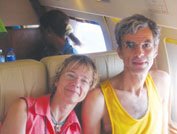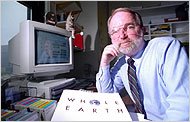[
We're heading to points north today to visit family for the Easter holiday. I love the southern US, but the forecast here for Sunday is sunny and 91F/33C - that just ain't right, especially for the Easter Bunny. As I'll be AWOL for a spell, here's a lengthy post with a lot of great links, particularly for docs and other health-related folks. Best wishes to all for Passover, Easter, and whatever PZ Myers is celebrating this time of year.]This week's
New England Journal of Medicine (13 April 2006) has two outstanding lead articles on the challenges facing health care delivery in New Orleans in the wake of Hurricanes Katrina and Rita. I applaud NEJM for making these two articles available
here and
here as free full-text.
The first even includes a podcast interview with the two co-authors (see right sidebar on NEJM page).
(In an unrelated but relevant topic, the post-Katrina articles are followed by
another free full text article that ironically discusses the challenges of free public access to the medical literature.)
The content of the two post-Katrina articles can be summed up by this passage and quote:
Reflecting recently on the vast scope of the rebuilding effort, Fred Lopez, vice chair for education at Louisiana State University (LSU) School of Medicine, observed, "The desperate week we spent inside Charity after Katrina is the one that everybody saw on CNN, but that was the easiest week of the last six months."
In my mind, the personal sacrifices of physicians, nurses, and all allied members of the medical team in New Orleans and elsewhere to care for the sick and impovershed has been nothing short of amazing. Katrina has also spawned one of my new favorite medbloggers, Dr Michael Hebert and
Doctor Hebert's Medical Gumbo. Here's just
a simple post of his on the problems faced by those of means following the hurricane - his earlier posts immediately following Katrina are truly fabulous and listed under his "Very Best Essays." I was particularly moved by
this and
this.

I bring up the two new NEJM articles because I promised in my earlier post on the need to study
rare cancers that I'd someday speak about two of my colleagues from my old institution, Dr Tyler Curiel and Dr Ruth Berggren. I guess timing is everything: as it turns out, Tyler and Ruth wrote the main NEJM article and Ruth wrote the inset article that describes how "two outpatient clinics serving the disenfrachised have adapted in creative ways to deliver community-based care to New Orleans." One is these is
Common Ground, a grassroots clinic recently featured in articles like
this one by Peter Eichenberger. As of March, Ruth reports that Common Ground has provided 10,000 free patient visits. So, if you have a couple of extra bucks and are looking for a good cause, dial up commongroundrelief.org on the ol' internet.
A Remarkable CoupleThese two physician-scientists are now affiliated with Tulane University. Ruth is an infectious disease specialist and primary care provider at the Charity HIV Outpatient Clinic and is an associate professor in Tulane's Section of Adult Infectious Diseases. Tyler is a full professor and chief of Tulane's Section of Hematology and Medical Oncology who also holds a MPH. Both are also incredible distance runners and Tyler is a 7-time finisher of Colorado's HardRock 100 ultramarathon. As if that's not enough, Tyler shattered the former Guinness record for
distance ran in 24 hrs while dribbling a basketball (108.41 miles vs. previous record of 97.47 miles). Tyler undertook the effort in raising over $40,000 to support a sinonasal undifferentiated carcinoma (SNUC) research project for his late medical student,
Andy Martin, who was afflicted with this rare cancer.
Erika Check wrote
a nice article on the two of them in
Nature following their evacuation from N.O. after a week of caring for patients in the middle of and the aftermath of the storm. You may have seen one or both of them on CNN with Sanjay Gupta. Ruth wrote
a terrific essay in NEJM last October (also free full text) chronicling the acute issues during their week following the hurricane, such as trying to evacuate patients while being shot at by a sniper.
My family just happened to be visiting Colorado in September while Tyler, Ruth, and their kids were bunking with her parents outside of Denver through January or so. I had been trying to find out how they were doing via e-mail and between me and
Wall Street Journal writer, Amy Dockser Marcus, we hunted them down and found that they were all safe. Foolishly, I made a trail running date with them early one morning near
Red Rocks Amphitheatre Park, home to immortal concerts by U2 and the Dave Matthews Band, among others. It's also where I proposed to PharmGirl, MD, before an R.E.M. concert in 1999 (full disclosure: actually, she sort of said, "Wouldn't this be a great place to propose to me?")
Fortunately, only Tyler showed up to humiliate me as Ruth had to take care of the kids - not only am I now a flatlander but I'm also 20 lbs/9 kg heavier than during my Colorado running days. While we ran and I tried to keep my lungs from exploding (the trails around Red Rocks are at over 6000 ft/1830 m altitude), Tyler told me how his laboratory group was now scattered at three or four other universities and he was in the process of writing new IRB and IACUC protocols for his projects at
each institution. He was going from our run directly to the University of Colorado Medical Center to give a seminar on his work with regulatory T cells and cancer immunotherapy.
Would you return to New Orleans?But what struck me once the hypoxia resolved was how fiercely proud he and Ruth were of what they have built at Tulane. Tyler has mentored several junior faculty members, MD and PhD, to garner their own independent funding and has put together a fabulous hematology/oncology division. I'm less familiar with Ruth's work, but it is clear from her writing that teaching and caring for HIV patients in New Orleans is more of a mission than the already-demanding career of an ID physician.
Moreover, Tyler and Ruth could really go anywhere else and start over, with better resources and far less hassle. Who would really blame them if they left their labs in the ruins of the flood and move on to another institution? Instead, they are admirably dedicated to their patients and institution and have returned to N.O. to rebuild, quite possibly bigger and better than before. Amazingly, they are not outliers: they report in yesterday's NEJM that Tulane's internal-medicine program has lost only 6 of its 90 residents. Other programs were not as fortunate as 11 of 24 medicine-pediatrics residents have not returned.
I wonder if I would have the fortitude and strength of character to do what Tyler and Ruth have done and continue to do in the face of seemingly insurmountable obstacles. I'll be certain to reflect on them and their example the next time I complain about a grant not being funded or some administrator denying a request for new laboratory equipment. I hope you take the time this weekend to read the two current NEJM articles to understand how the US government has deserted the people of New Orleans. (Again, the articles are
here and
here.)
The heart and soul of medicine is still alive, and can be found south of I-10.






